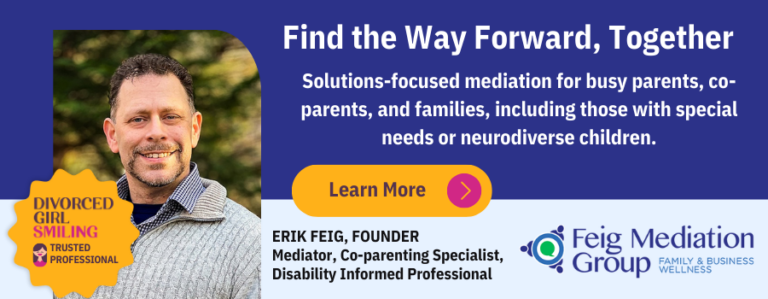“I’m getting divorced—I need an aggressive divorce attorney.” “First thing to do is make sure you have a strong divorce lawyer to fight them.” “I’ve been through a divorce; don’t let them mess things up any further. Lawyer up!” Does any of this sound familiar? They’re common types of responses I see on social media and online forums when someone announces their marriage is ending and seeks guidance on a divorce strategy.
This kind of advice and divorce strategy often leans toward an aggressive, win-at-all-costs approach, steeped in stories about what disaster can result if you’re not combative enough. But while understandable in the face of everything going on, this prevalent approach may not always be the most beneficial – let alone healthiest – path to take.
A Win-Lose Divorce Strategy Isn’t the Only Way to Go
As a family mediator who helps divorcing couples and parents navigate divorce and their co-parenting afterward, I notice a common theme: the default tends towards the adversarial. It’s you against them—a race to win or at least not to lose.
Divorce is a whirlwind of powerful emotions—anger, frustration, anxiety, sadness, fear, and grief. The process, and the transitions involved, can seem overwhelming, and these feelings are a testament to that. Acknowledging these emotions and their impact on your decision-making can be important for so many reasons. Not least is how the choices you make now can influence your and your children’s paths into the future.
Many families come to me as a mediator looking for an alternative to litigation and the adversarial, win-lose negotiations that accompany the legal process. They want to minimize the damage that comes from systems seemingly designed to pit them against each other until solutions come either from exhaustion or because you can’t afford the damage that comes from continually arguing about who’s more right.
Is Reducing Conflict One of Your Goals?
Considering a less adversarial divorce process can sometimes bring a sense of relief, knowing that healthier options are available. Choosing such a path can be a more positive option for you and your children in the longer term, reducing stress and empowering you to have more control over your future even when the current situation may feel beyond control.
It can also be a first step in changing how you – the parents – interact with each other in the longer term as you move beyond whatever led to your decision to divorce.
Here’s the thing: adversarial processes are built around finality and competition, not cooperation and flexibility. They aren’t focused on helping both of you practice the skills you’ll need to deal with the inevitable changes and future disagreements—to shift from battling things out to working things out.
As parents who become co-parents, there will be times when you’ll still need to work together to figure things out—but now across two homes instead of one. It’s not the attorneys who will be there when your sick child needs to be picked up from school or when you have to work late. Your children will still need you both.
A Mediator’s Three Questions to Help You Set Your Path
I want to share a few questions to also consider as you decide how to approach your divorce and what resources you’ll engage to support you through it and beyond.
Think of these questions as a starting point—adding another dimension beyond the adversarial—to help you as you determine your next steps. Even if parental cooperation feels out of reach right now, these questions can help you make an initial “deposit” toward a more cooperative future than you might currently envision.
1. Will the path you choose for your divorce set you up to work together afterward any better than when you started?
2. Will it create a foundation for effective co-parenting after the divorce is complete and the attorneys and experts are gone?
3. What kind of co-parenting relationship do your children need from both of you and what steps—and resources—can you engage to make that a reality?
By considering these questions, you’re already laying a foundation for more than just getting through the divorce—you’re actively taking steps to shape a healthier future for yourself and your children.
Like this article? Check out “How to Ask Forgiveness from Someone You’ve Hurt”





















